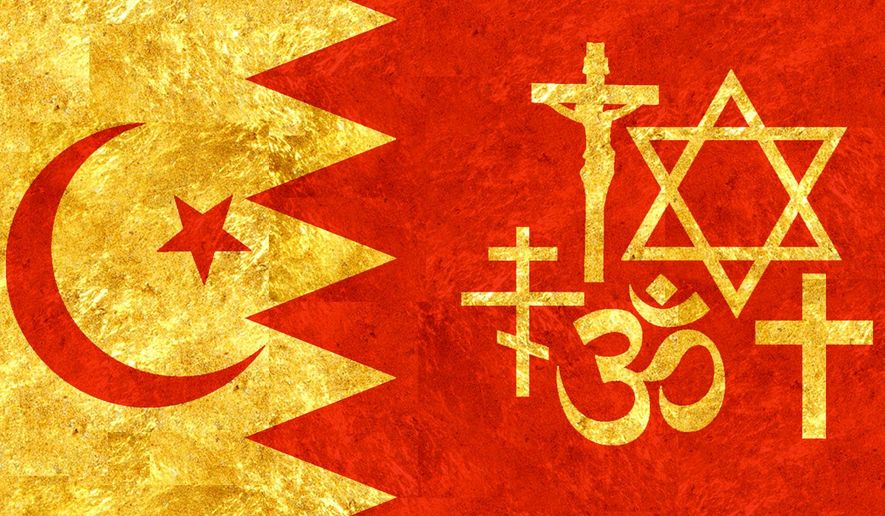OPINION:
In the Kingdom of Bahrain, for centuries we have grown up with neighbors of all faiths, all cultures and all ethnicities, so we are happy and comfortable living in a multicultural, multifaith society, and we recognize this diversity as a natural and normal way of life for us in Bahrain.
Our noble ancestors began this Bahraini tradition of churches, synagogues and temples being built next to our mosques, so there is no ignorance about others’ religious rites or practices. We all live together in peaceful coexistence in the spirit of mutual respect and love, and we believe it is our duty to share this with the world. We believe “ignorance is the enemy of peace,” and that true faith illuminates our path to peace. For this reason, we decided to compose the Kingdom of Bahrain Declaration, calling for religious tolerance and peaceful coexistence throughout the entire world.
Some may find this surprising, but not the hundreds of millions of peace-loving Muslims around the world. We composed the declaration in consultation with Sunni and Shiite scholars, along with Christian clergy and Jewish rabbis, including our friend, Rabbi Marvin Hier of Los Angeles’ Simon Wiesenthal Center.
As Bahrainis, we drew from our national heritage as a beacon of religious tolerance in the Arab world during a time when religion has been too frequently used throughout the world as a divine sanction to spread hate and dissension.
Yet in Bahrain, religious diversity is a blessing to our people. We welcome our Catholic, Orthodox and evangelical church communities. We are proud that our Hindu nationals can worship in a 200-year-old temple complete with their images, just around the corner from the Sikh temple and the mosques.
We celebrate our small — but precious — Jewish community, who feel free to wear their yarmulke and worship in their own synagogue, which, we are informed, is the only one in the Arabian Peninsula. In fact, our Jewish community plays a very active role at the highest levels of society, including an ambassador from Bahrain to Washington in 2008, the first Jewish diplomat to the United States from an Arab country. We wanted to protect our religious pluralism for future generations, so we have enshrined this in law, which guarantees everyone the right to worship unhindered in safety and to build their houses of worship.
The Kingdom of Bahrain is stronger because of our diversity, and I believe our world will be more secure and more prosperous when we learn to recognize the beauty of these differences and how they can teach us many lessons, including the lesson of religious tolerance. Religious freedom should not be viewed as a problem but rather a very real solution to many of our world’s biggest challenges and especially terrorism, which knows no religion and threatens all peace-loving people.
We firmly believe this evil can only be eradicated by the power of true faith and love, and this is what compelled us to write the Kingdom of Bahrain Declaration as a serious document calling for pluralism, which “unequivocally rejects” compelled religious observance, and condemns acts of violence, abuse and incitement in the name of religion. For national leaders like myself, the declaration makes it clear that “it is the responsibility of governments to respect and protect equally both religious minorities and majorities,” and that there is no room for religious discrimination of any kind.
The Kingdom of Bahrain Declaration is a call for leaders and for the masses, and it calls upon clerics and clergy, rulers and presidents, and regular citizens to “do all within our power to ensure that religious faith is a blessing to all mankind and the foundation for peace in the world.”
In the Arab world, we need not fear religious pluralism, and the non-Arab world need not fear us. In fact, we need one another, and we must meet one another along a path of mutual respect and love. Perhaps, only then will we find the elusive path of peace we seek.
It is our dearest wish that the Kingdom of Bahrain Declaration will inspire others to believe in their hearts that there is a better way, and to do everything in their power to find it. As the Holy Koran says, “It is not the eyes that turn blind, but it is the hearts that turn blind.” (Al-Hajj 22:46).
May our faith in God and in our fellow man call us to persevere until together, we create a more peaceful world for our children and their children.
• Hamad bin Isa Al-Khalifa is the king of Bahrain.




Please read our comment policy before commenting.